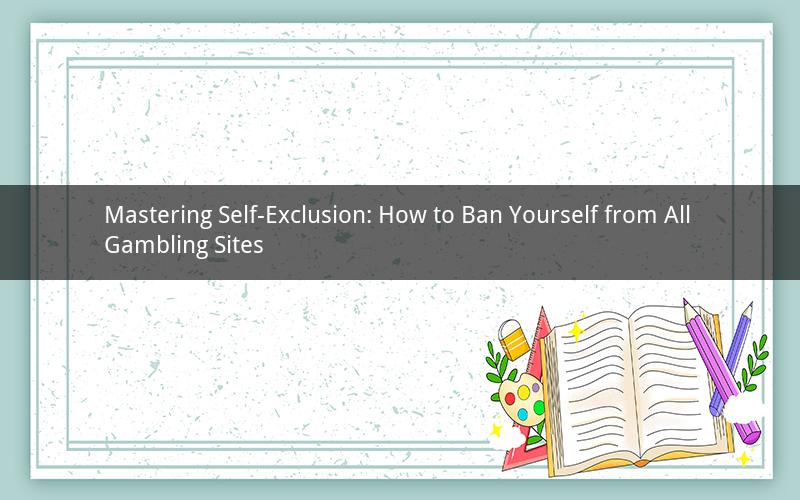
Introduction:
Gambling can be an addictive activity that can lead to financial and emotional problems. If you or someone you know is struggling with gambling addiction, self-exclusion is an effective strategy to take control of your life. In this article, we will guide you through the process of how to ban yourself from all gambling sites and provide you with tips on maintaining a healthy lifestyle.
1. Identify Your Gambling Habits:
Before taking any action, it's essential to understand your gambling habits. Keep a journal of your gambling activities, including the amount of time you spend on gambling sites, the types of games you play, and the emotions you experience during and after gambling. This will help you recognize patterns and triggers that contribute to your addiction.
2. Find Self-Exclusion Programs:
Several organizations offer self-exclusion programs to help individuals avoid gambling. Research and identify self-exclusion programs available in your country or region. In the United States, for example, the National Council on Problem Gambling provides a list of self-exclusion programs for various states.
3. Enroll in a Self-Exclusion Program:
Once you have identified a suitable self-exclusion program, enroll in it. The process may vary depending on the organization, but generally, you will need to provide personal information, such as your name, address, and date of birth. Some programs may require you to visit a physical location to complete the enrollment process.
4. Ban Yourself from Online Gambling Sites:
After enrolling in a self-exclusion program, you will receive a list of gambling sites that are part of the program. Take the time to visit each site and complete the self-exclusion process. This typically involves filling out a form or contacting the site's customer support team to request a ban. Be sure to save any confirmation emails or documents for your records.
5. Remove Gambling Apps from Your Devices:
To further prevent access to gambling sites, remove any gambling apps from your devices. This includes smartphones, tablets, and computers. If you find yourself unable to delete the apps, consider seeking assistance from a trusted friend or family member.
6. Seek Support and Resources:
Dealing with a gambling addiction is challenging, and seeking support is crucial. Reach out to friends, family, or support groups for encouragement and guidance. Additionally, consider seeking professional help from a therapist or counselor specializing in gambling addiction.
7. Develop a Support System:
Surround yourself with individuals who support your decision to quit gambling. Inform them about your self-exclusion plan and ask for their understanding and assistance. They can help you stay accountable and offer a shoulder to lean on during difficult times.
8. Create a Healthy Routine:
To replace the time and energy spent on gambling, develop a healthy routine. Engage in activities that promote physical and mental well-being, such as exercise, hobbies, or volunteering. This will help you stay occupied and reduce the urge to gamble.
9. Monitor Your Progress:
Regularly review your progress and adjust your self-exclusion plan if necessary. Keep a journal to track your achievements and challenges. Celebrate your successes and seek help when needed.
10. Stay Informed:
Stay updated on resources and support available to individuals struggling with gambling addiction. Attend workshops, webinars, or support group meetings to expand your knowledge and network with others facing similar challenges.
Frequently Asked Questions:
1. How long does self-exclusion last?
Self-exclusion typically lasts for a specific period, such as one year or five years. However, you can extend the duration or request a permanent ban if needed.
2. Can I reverse the self-exclusion process?
No, once you have enrolled in a self-exclusion program, you cannot reverse the process. However, you can re-enroll for a different duration or request a permanent ban.
3. Can I still play gambling games with friends or family?
While it's important to maintain healthy relationships, it's advisable to avoid any form of gambling, including social gaming, during your self-exclusion period. This will help you stay focused on your recovery goals.
4. What if I accidentally access a gambling site?
If you accidentally access a gambling site, report the incident to the self-exclusion program administrator. They can help you understand the consequences and provide guidance on how to prevent similar situations in the future.
5. Can self-exclusion help me overcome my gambling addiction completely?
Self-exclusion is a valuable tool in the recovery process, but it is not a guaranteed solution. Overcoming a gambling addiction requires a holistic approach, including therapy, support, and lifestyle changes. Self-exclusion can be an essential component of your recovery journey.